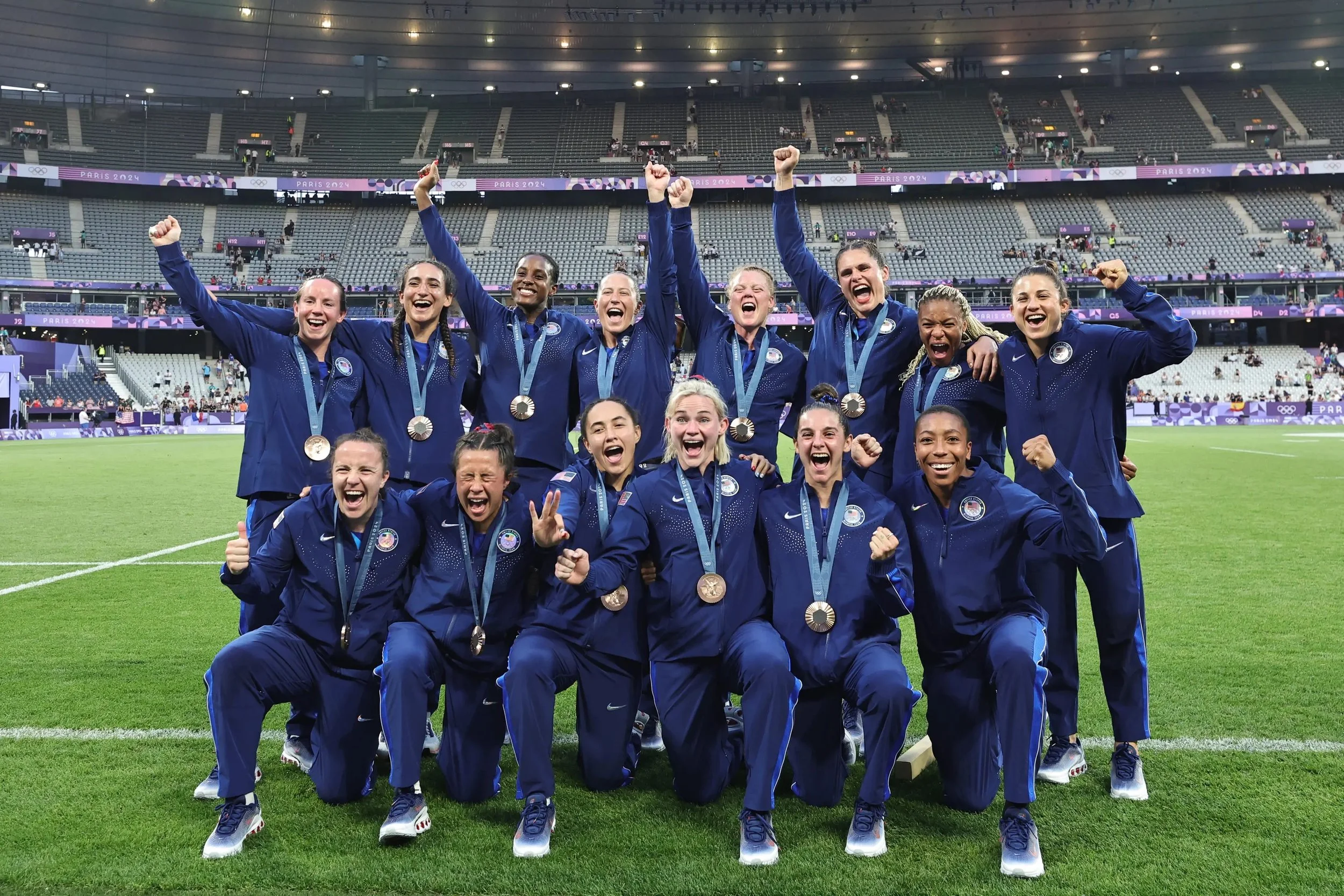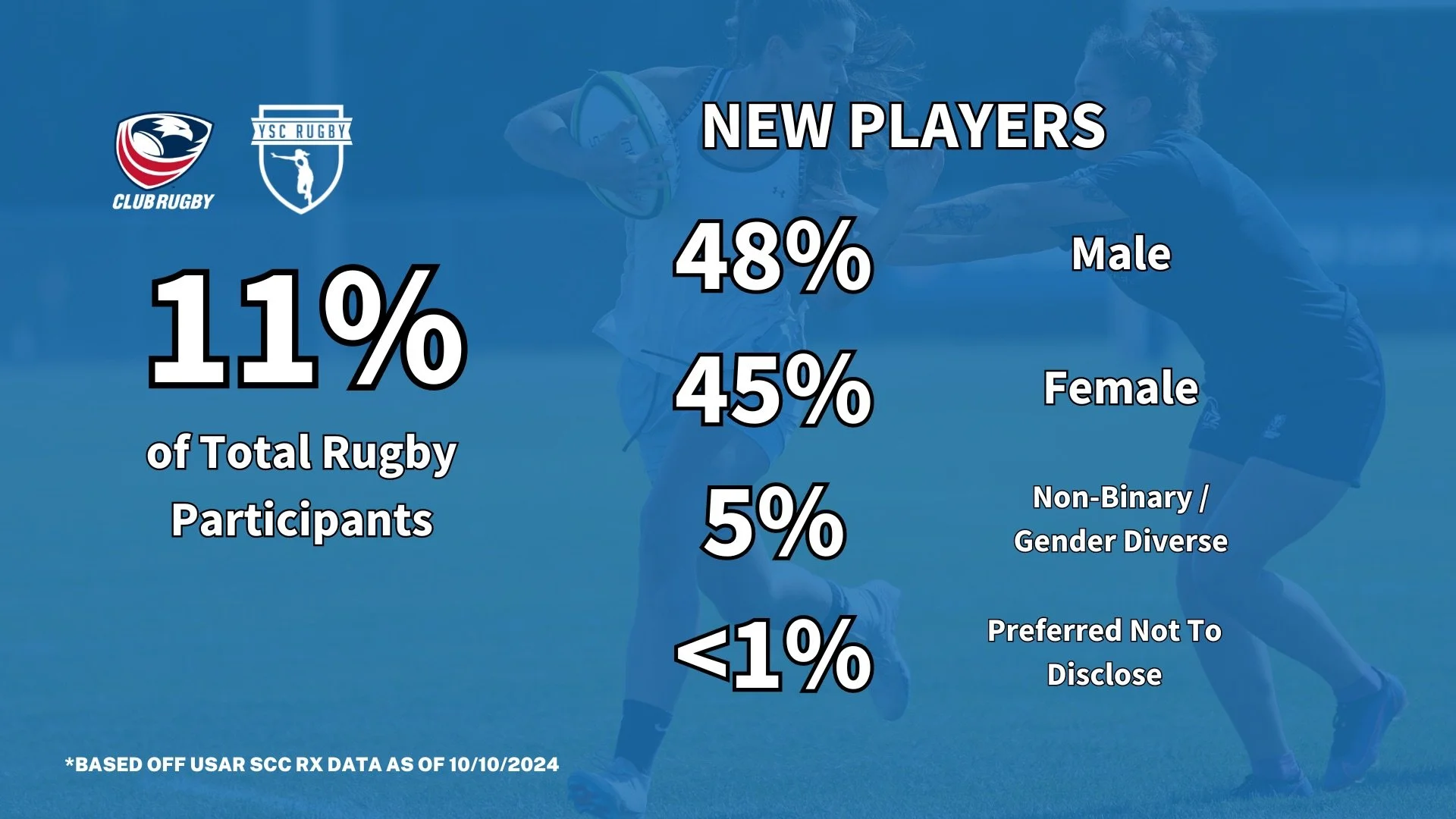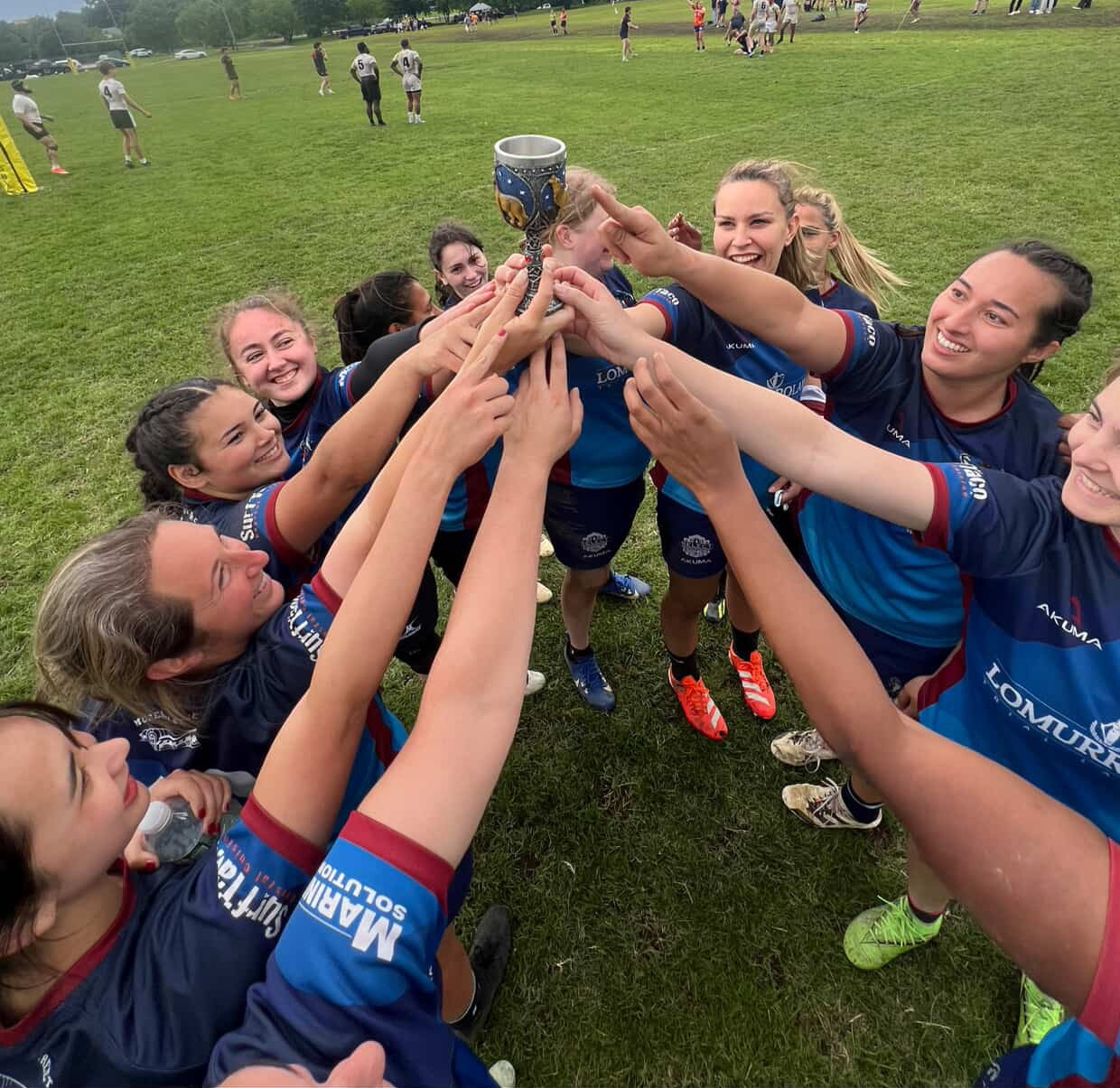One Year Since Bronze: My Love Letter to Rugby
The USA Rugby 7s Team after defeating Australia to win their bronze medal at the 2024 Paris Olympics (Mike Lee | KLCfotos)
In February of 2025, I went out on a limb and joined my local women’s rugby team after a few months of looking for a brand new hobby, but the story doesn’t start there for me or any other women’s rugby player in the United States.
You may or may not be shocked to find out that the history of women’s rugby in the United States is younger than most of our mothers and grandmothers, and has dramatically unfolded since the passing of Title IX in June of 1972. For a sport that’s believed to have originated in 1823 and is played all over the world, that’s a shockingly recent start to the history of established women’s rugby in the United States. However, the lack of resources and funding due to sex-based discrimination (especially for women’s full-contact sports) before 1972 makes the story of the USA Women’s Rugby team winning bronze only 53 years later at the 2024 Paris Olympics that much more inspirational.
The “Eleanor’s” of Pasadena, California, 1978 (Courtesy of US Women’s Rugby Federation History Museum)
The first USA women’s international game, played against Canada in 1987, led to the USA’s impressive win of the first-ever Women’s Rugby World Cup (yes, that same one that Ilona Maher was talking about coming up later this summer) in 1991.
You might be wondering what every other country was doing with women’s rugby before Title IX in the United States - what year did the reigning World Cup and Olympic Gold champions, the New Zealand Black Ferns, begin play? How about Canada, the United States’ first international opponent? How about England’s Red Roses, you know, the place where rugby is thought to have originated? If you guessed that the United States stepped up to an insanely developed, flourishing international women’s rugby community, you’d be wrong. Kind of. Many other international teams began play in the late 80s and early 90s, with some even missing the inaugural 1991 World Cup. Yes - even the Black Ferns missed the 1991 World Cup, as women were playing rugby in New Zealand, but an international team wasn't recognized and supported until 1989. It wasn’t that women weren’t trying to organize teams or interested in playing and watching the sport, but that the opportunities weren't presented or afforded to them to create professional teams and establish high school and collegiate legacies alongside their schools' or their country’s men's teams.
In 2024, the first women’s professional rugby league in the United States, Women’s Elite Rugby (WER), began play with six teams and allowed women’s rugby players to play professionally outside of the national team. While many of the WER’s original core players also belong to Team USA, this opportunity brought many senior women’s club players from across the country to a more elite (no pun intended) level of play, paving the way even further after the Olympic win for American women to not only play professional domestic rugby, but also to watch and become fans of professional women’s rugby.
Team USA bringing home the bronze medal this year truly was not just a win for them, but a win for every single women’s rugby player in the United States. While the sport has been (mostly) picked up in other countries with grace, the United States still struggles with involvement surrounding men’s professional rugby, much less the women’s side. Theorizing a fulfillment from American football that other countries don’t get, many American rugby players have wondered why it seems more complicated to get people involved here. The lack of access in the US to high school programs, pathways to national teams, and clubs with established finances, gear, staff, and connections to USA Club Rugby points at why many folks don’t get involved until after college, and why growing up interested in the sport is few and far between unless you have relatives or friends that play.
The 2024 Olympics, though, put rugby on the board in a place that people were paying attention, and the women’s rugby community latched on to the opportunity while they could. Everyone knows Ilona Maher, a Center/13 for Team USA, whose social media presence not only sparked interest in women’s rugby but also kept people engaged before, during, and after the Paris Olympics. Her funny, body-positive, and personality-based social content at the Olympics and afterwards with the Premiership Women’s Rugby’s Bristol Bears and on Dancing With the Stars made people see her past the sport, which in turn had them interested in learning about her main gig, playing rugby.
Alex “Spiff” Sedrick’s last-minute breakthrough 80-meter try that evened the score against Australia caught the eyes of the world, and her two-point conversion kick left the USA with the win over Australia 14-12, for the United States’ first-ever Rugby 7s medal. Ever. As in Men’s and Women’s.
“We’re really trying to raise up rugby in the US, especially in the women’s game, so hopefully this will inspire someone to pick up a rugby ball.” - Alex “Spiff” Sedrick on winning the Bronze Medal in 2024.
And it did. USA Club Rugby, the governing body of all United States-based club rugby, saw an increase of 64.04% in participation for the 2024-2025 season as of October 2024, whereas the year before it had only seen a rise of 4.93% by the same time. 11% of participants for the 2024-2025 season were new players, with 72% returning.
Graphic courtesy of “Your Scrumhalf Connection”, with USA Club Rugby data on New Players from October 10th, 2024.
While only 26% of the returning players were women, 45% of the new players were women.
I’m happy to be a part of that 45%, having joined my women’s senior club team, Monmouth Women’s Rugby Football Club (MWRFC), in February of 2025, halfway through the fall 15s season. I returned home to New Jersey after a particularly difficult period in my life, spent living across the country in Wyoming. I was tired, lonely, and seeking something that would not only entertain me but also give me a sense of being part of something bigger than myself.
Although I didn’t join directly because of the Olympics, the first time I really paid any attention to the sport was when I got choked up while watching Spiff Sedrick break through defense to save the day for her team. That one moment helped give me the confidence and knowledge to try, even when I didn’t know what was on the other side of randomly joining a full-contact sport that I’d never played before.
It’s hard to explain in words what exactly rugby has done for me, from giving me something to look forward to at the end of some pretty miserable days to giving me new friends that I know will stick around for quite some time. What I can confidently say is that starting to play and coming back after an injury that almost derailed me early in my first season have been some of the best decisions I’ve made for myself. At the end of every winning game, fun tournament day, or night out with my teammates, I think of where I’d be if I hadn’t decided to push through and play, and find myself grateful to have such a supportive team around me willing to help me learn with an understanding not often afforded in adult team sports.
If you’ve been thinking about joining or watching rugby - do it. There’s no reason to wait for the perfect time, to worry about if you’ll be good enough or not, or to hold yourself back from enjoying it because of what other people might think. As a sport that a lot of Americans don’t start until college or after college, the chances that you’re going to join a team ready to help you learn and add another friend to the sport of rugby is high, as are the chances that you’ll fall in love with it.
MWRFC celebrating after we placed at a 7s tournament. (Courtesy of Diana Valencia)
No one team, athlete, or league can grow the game by themselves, so it even helps that you're reading about rugby right now and helping to spread the word about this amazing sport that gives so many women the chance to love what their bodies can do for them, join a fantastic community, and remain confident in themselves.
Happy bronze medal-iversary to Team USA - we’re rooting for you!






